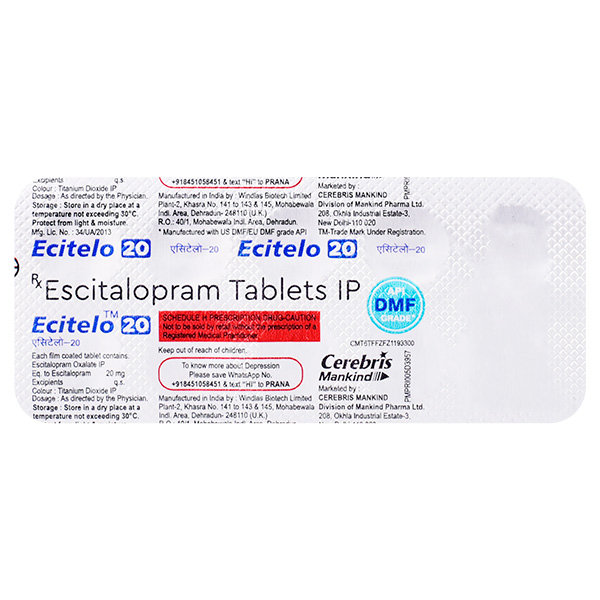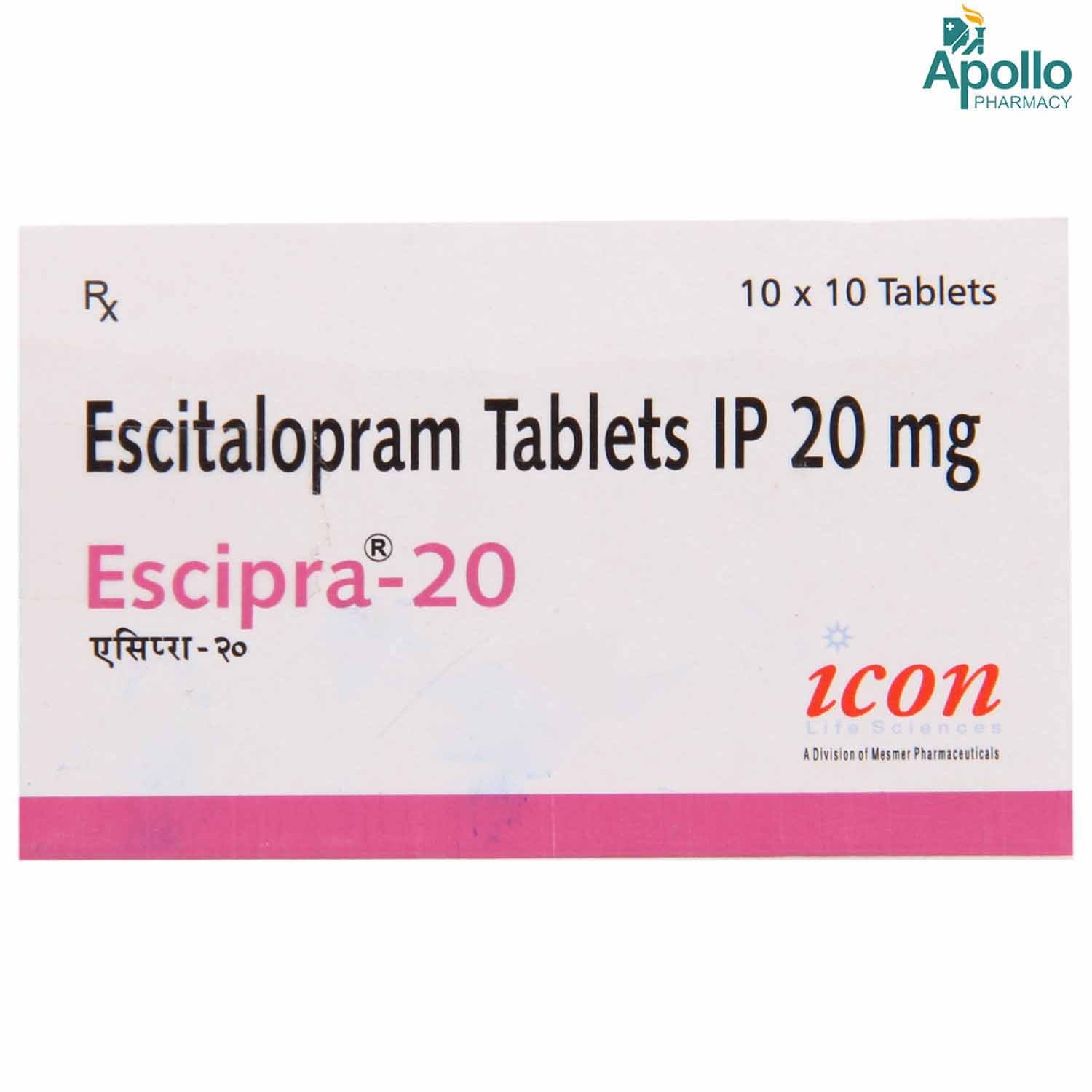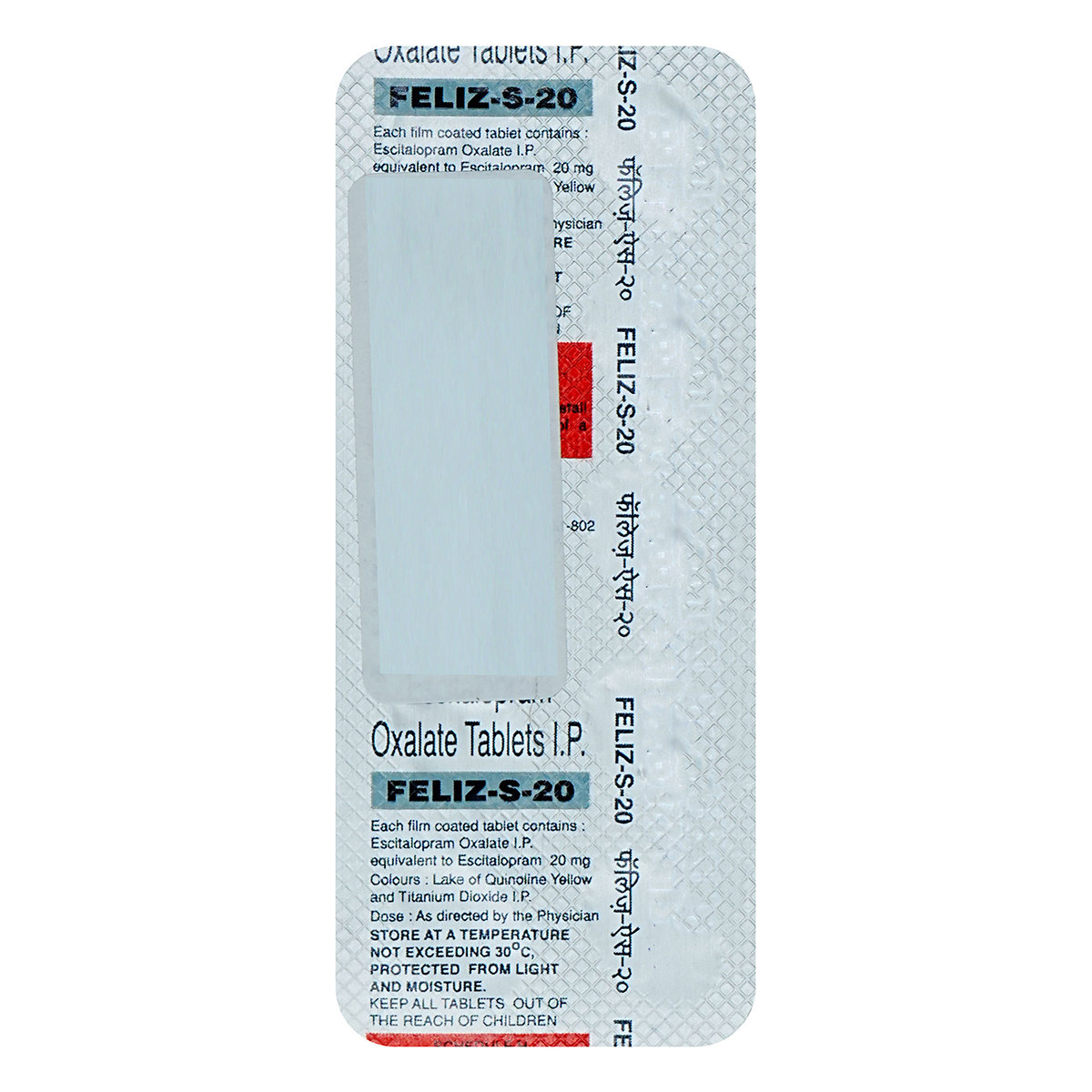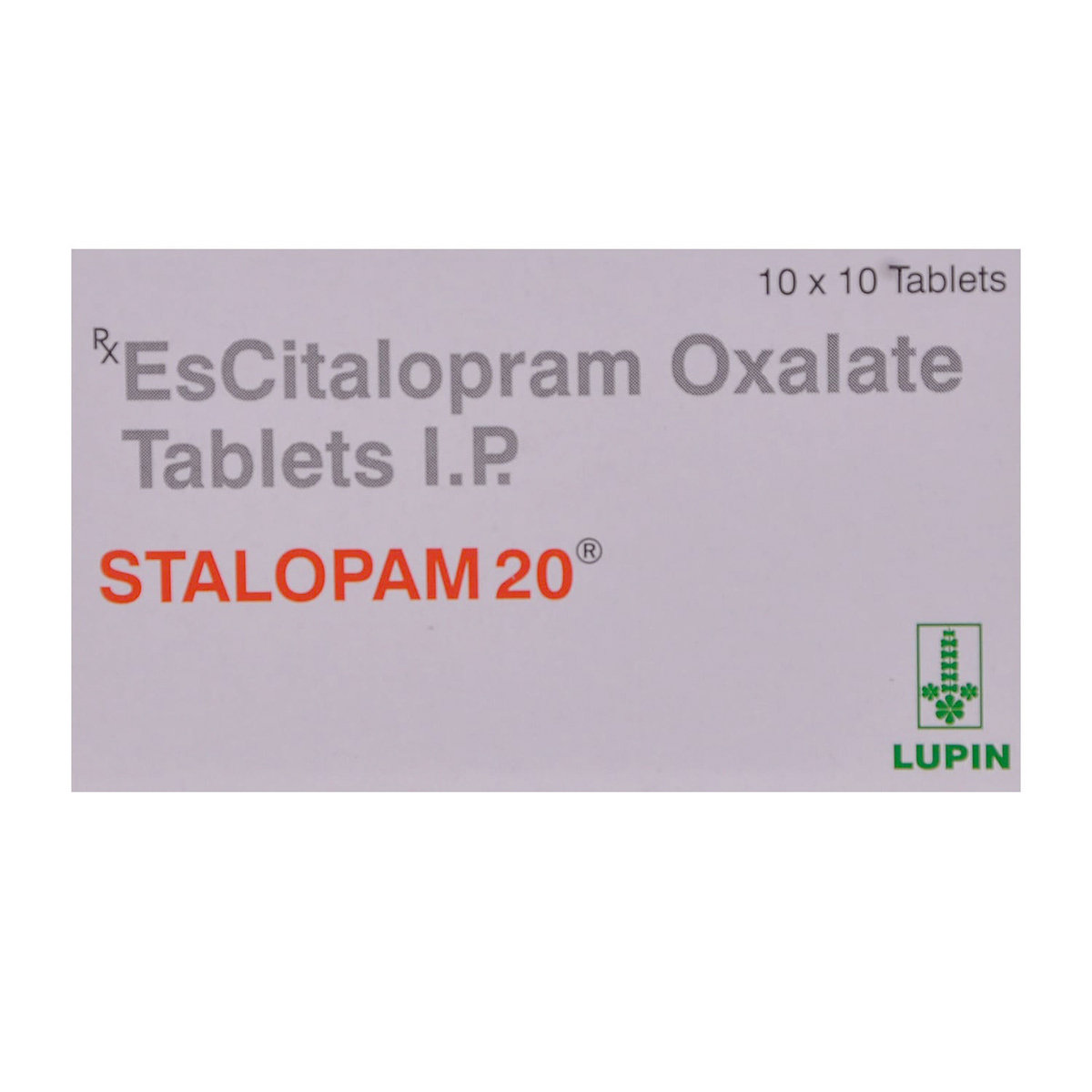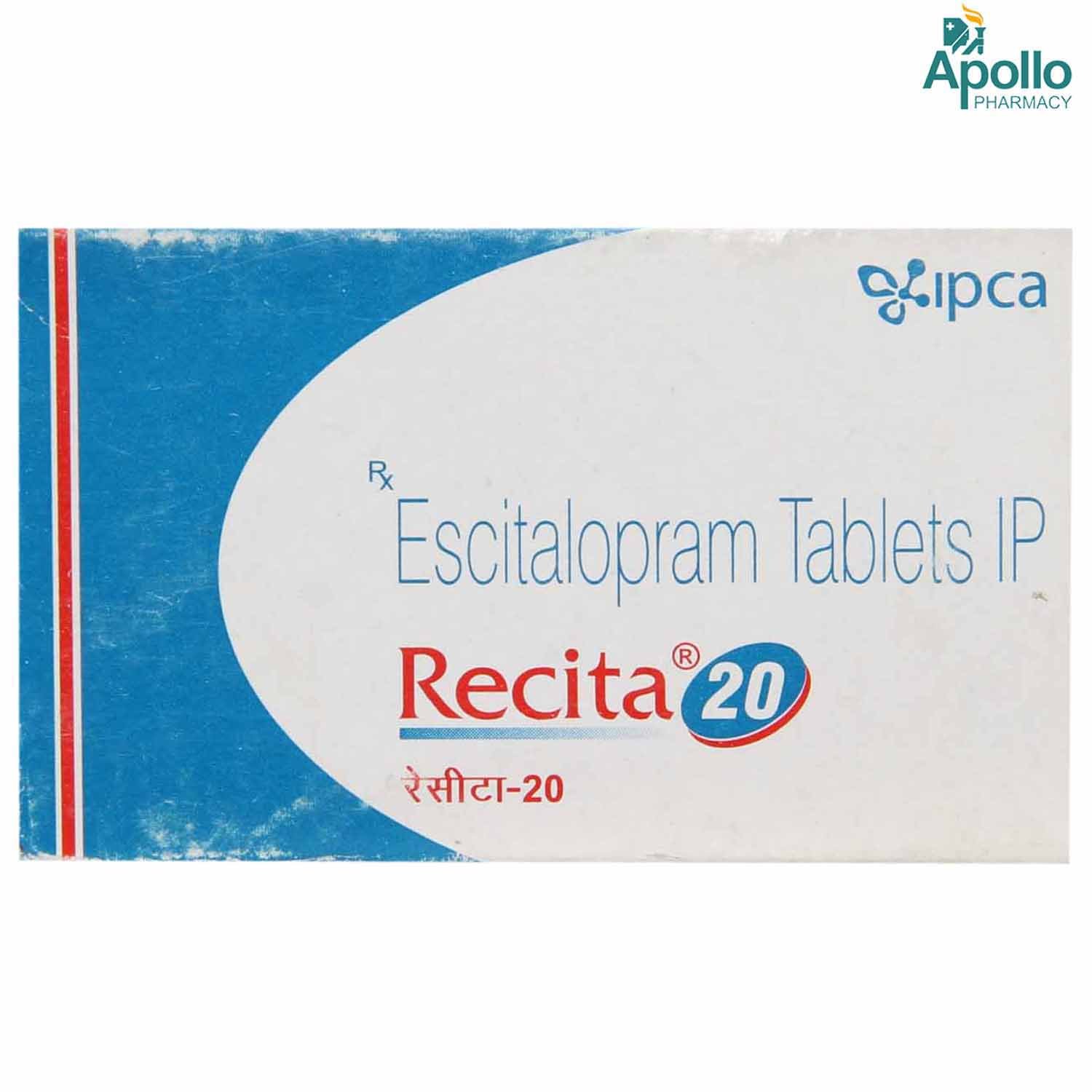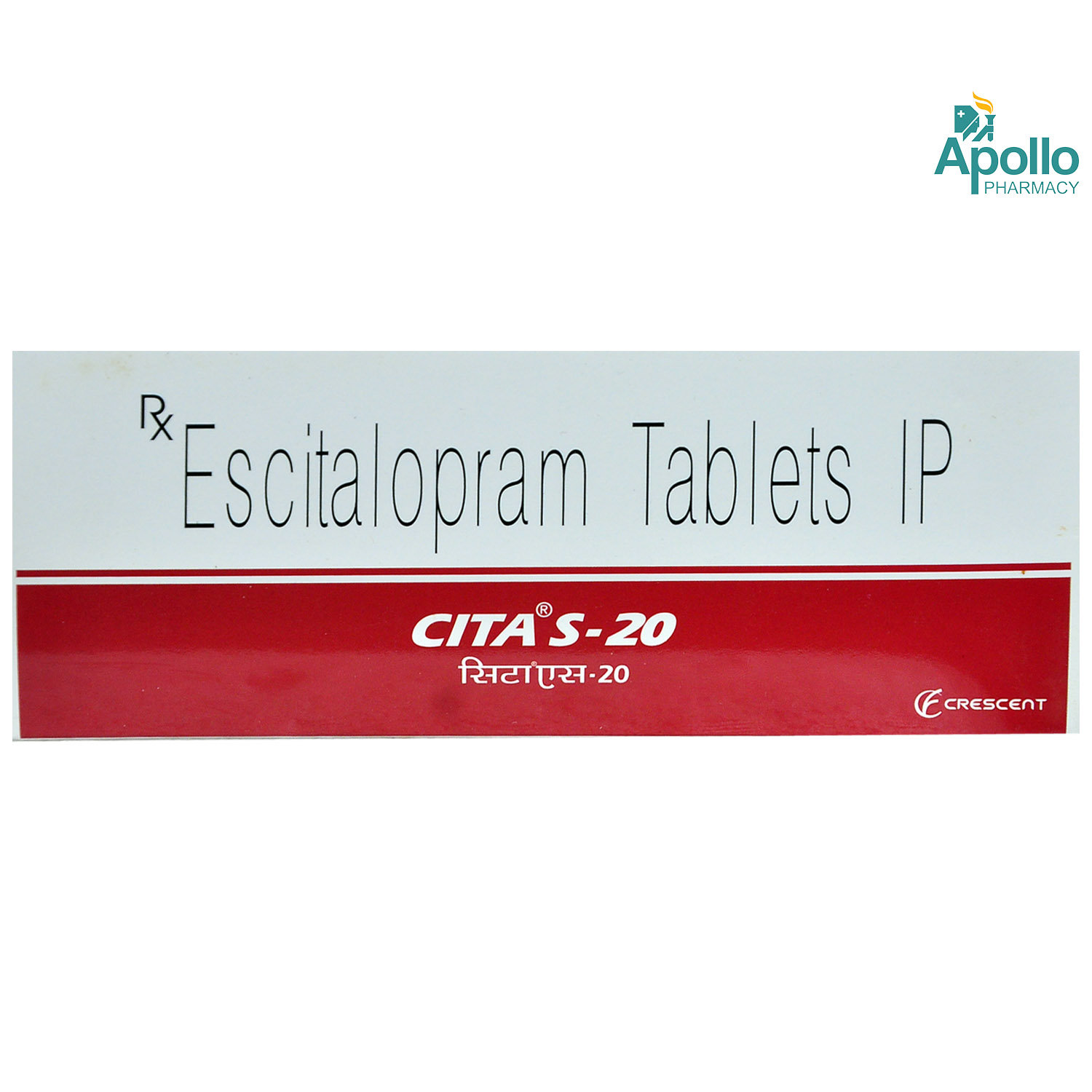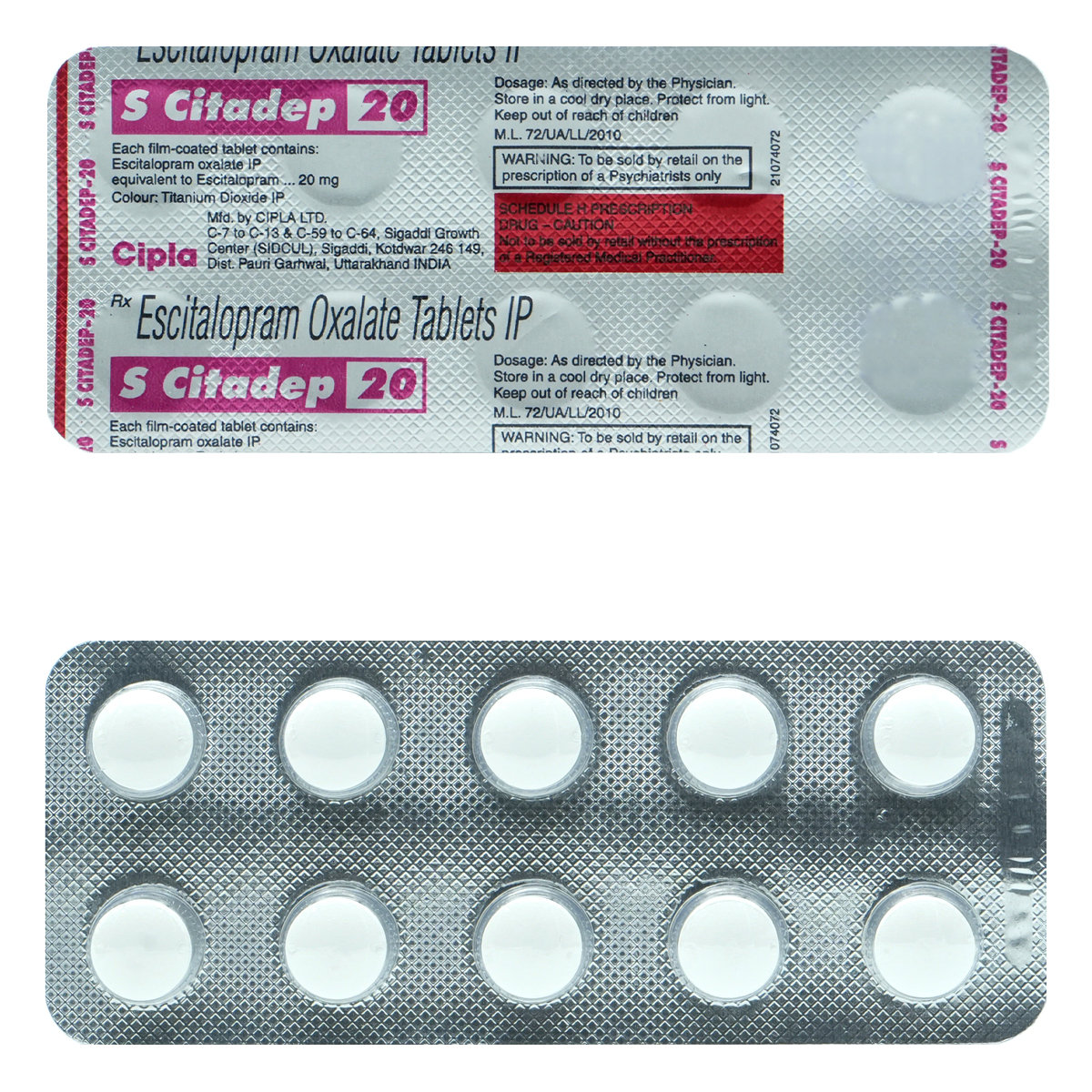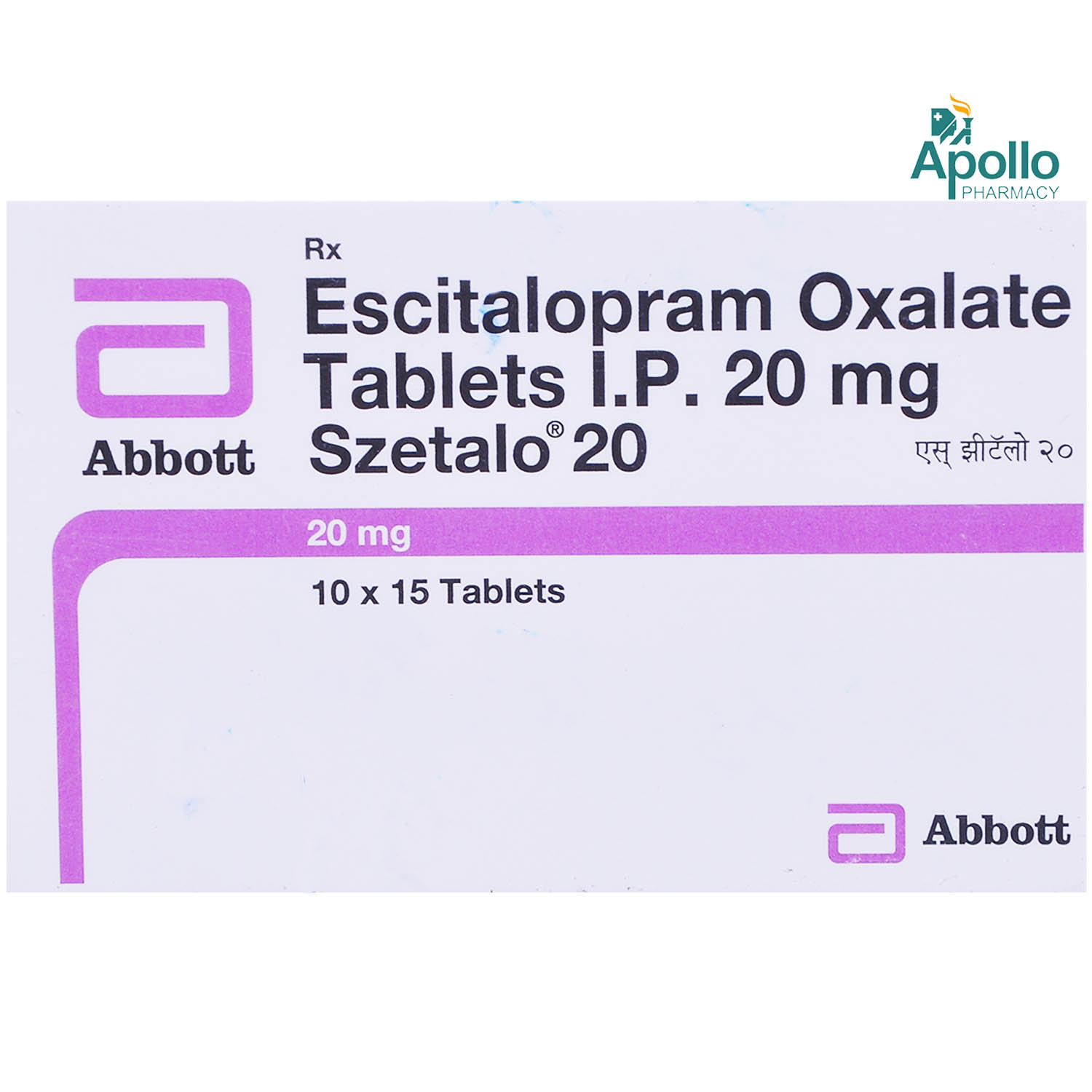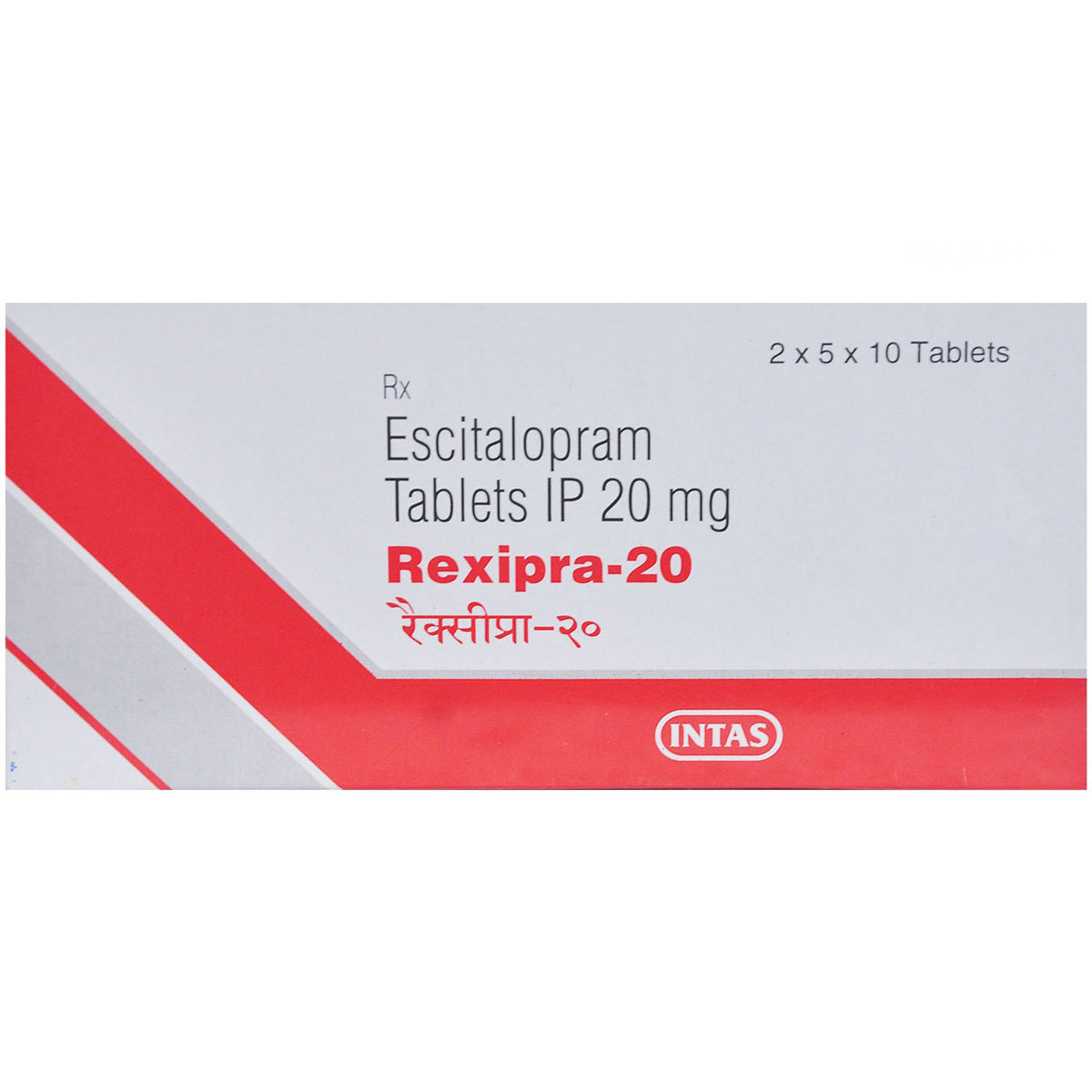Citapure 20 mg Tablet 10's
MRP ₹150.5
(Inclusive of all Taxes)
₹22.6 Cashback (15%)
Provide Delivery Location
Online payment accepted
 Prescription drug
Prescription drugWhats That
Composition :
Manufacturer/Marketer :
Consume Type :
Expires on or after :
Return Policy :
NPPA :
About Citapure 20 mg Tablet
Citapure 20 mg Tablet is a type of antidepressant which belongs to the class of selective serotonin reuptake inhibitors (SSRI) and is primarily used in the treatment of depression and other mental health conditions which include anxiety, panic disorder, and obsessive-compulsive disorder. Depression is a mood disorder that affects day to day life of a person. A person may have symptoms such as feeling sad or feeling of loss and might have mood swings. Anxiety is defined as an emotion that is characterized by feelings of tension, worried thoughts, and symptoms like increased blood pressure. Anxiety disorder also includes panic disorder which is characterized by sudden feelings of terror. In Obsessive-compulsive disorder (OCD), a person feels the need to think or perform things repeatedly.
Citapure 20 mg Tablet works by increasing serotonin levels. Serotonin is a chemical messenger in the brain which is responsible for improving the mood and physical symptoms of depression. It is also responsible for relieving symptoms of anxiety, panic attacks, and obsessive-compulsive disorders.
You can take Citapure 20 mg Tablet with or without food. It should be swallowed whole with a glass of water. Do not chew, bite, or break it. Your doctor will advise you on how often you take your tablets based on your medical condition. In some cases, you may experience a decreased or increased appetite, weight gain, pain, sweating, fatigue, or high fever. Most of these side effects of Citapure 20 mg Tablet do not require medical attention and gradually resolve over time. However, if the side effects are persistent, reach out to your doctor.
Try not to stop taking Citapure 20 mg Tablet of your own as it may lead to unpleasant side effects. Let your doctor know about this, as it may cause withdrawal symptoms. let your doctor know if you have epilepsy (seizure disorder or fits), diabetes, liver or kidney disease, any heart problems, or are currently taking medicines for depression known as MAO inhibitors (such as Isocarboxazid, Phenelzine, Selegiline) or problems with alcohol or other prescription drugs. These may affect your treatment also Inform your doctor if you are allergic to Citapure 20 mg Tablet .
Uses of Citapure 20 mg Tablet
Directions for Use
Key Benefits
Citapure 20 mg Tablet is a type of antidepressant which belongs to the class of selective serotonin reuptake inhibitors (SSRI) and is primarily used in the treatment of depression and other mental health conditions which include anxiety, panic disorder, and obsessive-compulsive disorder. Citapure 20 mg Tablet works by increasing serotonin levels. Serotonin is a chemical messenger in the brain which is responsible for improving the mood and physical symptoms of depression. It is also responsible for relieving symptoms of anxiety, panic attacks, and obsessive-compulsive disorders.
Storage
- Inability to have an orgasm can be managed by treating any underlying medical condition that has not been diagnosed.
- Observe yourself and try to understand why this inability occurs.
- Regularly do strengthening exercises to improve blood flow throughout the body to improve your desire.
- Implement massage techniques to enhance blood flow to organs.
- Take a balanced diet and quit smoking.
- Practice yoga and meditation to improve thought processes and have cognitive behavioural therapy.
Drug Warnings
Taking Citapure 20 mg Tablet should be avoided in patients having epilepsy (Brain disorder in which brain activity becomes abnormal, causing seizures), impaired liver or kidney function, diabetes, decreased level of sodium in the blood, tendency to easily develop bleedings or bruises, patients receiving electroconvulsive treatment, having coronary heart disease, suffering or have suffered from heart problems or have recently had a heart attack, having a low resting heart-rate, prolonged severe diarrhoea, and vomiting (Being sick) or using diuretics (water tablets), experiencing a fast or irregular heartbeat, fainting, collapse, or dizziness on standing up, which may indicate abnormal functioning of the heart rate, having or previously had eye problems, such as certain kinds of glaucoma (increased pressure in the eye).
Drug-Drug Interactions
Drug-Drug Interactions
Login/Sign Up
Using Citapure 20 mg Tablet together with Dasatinib can increase the risk of an irregular heart rhythm.
How to manage the interaction:
Although taking Dasatinib and Citapure 20 mg Tablet together can cause an interaction, they can be taken together if prescribed by a doctor. However, consult a doctor if you experience dizziness, or shortness of breath. Do not discontinue any medications without consulting a doctor.
Taking Citapure 20 mg Tablet and posaconazole together can raise the risk of an abnormal heart rhythm.
How to manage the interaction:
Although using Posaconazole and Citapure 20 mg Tablet together can result in an interaction, they can be taken together if advised by your doctor. However, contact your doctor if you experience drowsiness, lightheadedness, fainting, shortness of breath, or irregular heartbeat. Do not stop taking any medications without consulting a doctor.
Taking Ketoconazole and Citapure 20 mg Tablet together can increase the risk of abnormal heart rhythm.
How to manage the interaction:
Taking Ketoconazole and Citapure 20 mg Tablet together can result in an interaction, it can be taken if a doctor has advised it. However, if you experience sudden dizziness, lightheadedness, fainting, shortness of breath, or rapid heartbeat, consult a doctor immediately. Do not stop using any medications without talking to a doctor.
When linezolid, is taken with Citapure 20 mg Tablet it increases the risk of serotonin syndrome (condition in which a chemical called serotonin increase in your body).
How to manage the interaction:
Co-administration of linezolid along with Citapure 20 mg Tablet can lead to an interaction, they can be taken together if prescribed by a doctor. However, consult a doctor if you experience confusion, hallucinations (seeing and hearing things that do not exist), fits, blood pressure alteration, increased heart rate, fever, excessive sweating, shivering or shaking, blurred vision, pain in the muscles or stiffness, incoordination, stomach cramps, nausea, vomiting, and diarrhea. Do not discontinue any medications without consulting a doctor.
Combining Halothane with Citapure 20 mg Tablet can increase the risk of negative side effects.
How to manage the interaction:
There may be a possibility of interaction between Citapure 20 mg Tablet and Halothane, but it can be taken if prescribed by a doctor. If you notice any of these symptoms - dizziness, an irregular heart rhythm, a heart condition, conduction abnormalities, severe or prolonged diarrhea, vomiting, lightheadedness, fainting, shortness of breath or heart palpitations - contact your doctor immediately. Do not stop using any medications without a doctor's advice.
Combining Promethazine with Citapure 20 mg Tablet can increase the risk of serotonin syndrome.
How to manage the interaction:
Taking Citapure 20 mg Tablet with Promethazine together can possibly result in an interaction, but it can be taken if your doctor has advised it. If you notice any of these symptoms - feeling dizzy or lightheaded, fainting, palpitations, abnormal heart rhythm, shortness of breath, an irregular heart rhythm, a heart condition, severe or prolonged diarrhea, vomiting or complications - make sure to call your doctor right away. Do not discontinue any medications without consulting your doctor.
Combining Degarelix with Citapure 20 mg Tablet can increase the risk of QTc prolongation.
How to manage the interaction:
Taking Degarelix with Citapure 20 mg Tablet together can possibly result in an interaction, but it can be taken if your doctor has advised it. If you experience any symptoms like dizziness, fainting, or abnormal heart rhythm, contact your doctor immediately. Do not stop using any medications without a doctor's advice.
Taking amisulpride and Citapure 20 mg Tablet together can increase the chance of a serious abnormal heart rhythm.
How to manage the interaction:
Although taking amisulpride and Citapure 20 mg Tablet together can result in an interaction, they can be taken together if prescribed by a doctor. However, consult a doctor immediately if you experience dizziness, lightheadedness, shortness of breath, or heart palpitations. Do not discontinue any medications without consulting a doctor.
Taking ondansetron with Citapure 20 mg Tablet may increase the risk of serotonin syndrome (a condition in which a chemical called serotonin increases in your body).
How to manage the interaction:
Co-administration of ondansetron along with Citapure 20 mg Tablet can possibly result in an interaction, they can be taken together if prescribed by a doctor. However, consult a doctor if you experience confusion, hallucinations (seeing and hearing things that do not exist), fits, blood pressure alteration, increased heart rate, fever, excessive sweating, shivering or shaking, blurred vision, pain in the muscles or stiffness, incoordination, stomach cramps, nausea, vomiting, and diarrhea. Do not discontinue any medications without consulting your doctor.
When Doxorubicin is taken with Citapure 20 mg Tablet, the amount of Doxorubicin in the blood can go up.
How to manage the interaction:
There may be a possibility of interaction between Citapure 20 mg Tablet and Doxorubicin, but it can be taken if prescribed by a doctor. This can make the side effects of doxorubicin worse. If you notice any of these symptoms - feeling dizzy, lightheaded, or faint, having a fast or irregular heartbeat, feeling short of breath, or having prolonged diarrhea or vomiting - contact your doctor immediately. Do not stop using any medications without a doctor's advice.
Drug-Food Interactions
Drug-Food Interactions
Login/Sign Up
Diet & Lifestyle Advise
- Doing regular exercise can help lower anxiety by releasing endorphins and improving sleep.
- Find humour in your daily life. Try to watch light-hearted shows to help relieve stress.
- You can try increasing your mindfulness by including yoga, meditation, cognitive therapy, and mindfulness-based stress reduction.
- Drink enough water to stay hydrated, and limit or avoid alcohol and caffeine to relieve anxiety.
- Include a diet rich in whole grains, vegetables, and fruits. This is a healthier option than eating many simple carbohydrates in processed foods.
- Herbs like turmeric, ginger, and chamomile contain anti-inflammatory properties. Including these stuff in meals can reduce inflammation caused due to anxiety disorder.
- Reduce your alcohol, caffeine, added sugar, high salt, and high fat intake. Significantly transfat may help also help reduce inflammation.
- You can include antioxidants in your daily diet, like ashwagandha, omega-3 fatty acids, green tea, and lemon balm.
- Try to spend time with your friends and family. Having a solid social network may help you lower your risk of anxiety.
Side Effects of Citapure 20 mg Tablet
- Nausea
- Headache
- Blocked or runny nose (sinusitis)
- Increased or decreased appetite
- Anxiety
- Restlessness
Habit Forming
Therapeutic Class
All Substitutes & Brand Comparisons
RX
Ecitelo 20 mg Tablet 10's
Mankind Pharma Pvt Ltd
₹133
(₹11.97 per unit)
11% CHEAPERRX
Esta 20 Tablet 10's
D D Pharmaceuticals Pvt Ltd
₹150.5
(₹13.24 per unit)
2% CHEAPERRX
Escipra-20 Tablet 10's
Icon Life Sciences
₹152.5
(₹13.42 per unit)
Drug-Diseases Interactions
Drug-Diseases Interactions
Login/Sign Up
FAQs
Drug-Drug Interactions Checker List
- PHENELZINE
- IPRONIAZID
- TRANYLCYPROMINE
- SELEGILINE
- LINEZOLID
- LITHIUM
- TRYPTOPHAN
- IMIPRAMINE
- DESIPRAMINE
- SUMATRIPTAN
- TRAMADOL
- CIMETIDINE
- LANSOPRAZOLE
- OMEPRAZOLE
- FLUCONAZOLE
- TICLOPIDINE
- WARFARIN
- DIPYRIDAMOLE
- PHENPROCOUMON
- MEFLOQUINE
- FLECAINIDE
- PROPAFENONE
Special Advise
- Citapure 20 mg Tablet causes drowsiness. Avoid doing activities that require your complete focus and attention like driving when on this drug.
- An abrupt stoppage of Citapure 20 mg Tablet can lead to significant withdrawal symptoms. Always discuss with your doctor about decreasing the dosage before completely stopping its usage.
- Avoid consuming alcohol while on this medication as it can lead to dangerous side effects.
- Citapure 20 mg Tablet is unsafe for usage if you're pregnant or are planning to get pregnant. Discuss with your doctor in such situations about changing/replacing the medicine with safer alternatives.
- Do not self-medicate.
Disease/Condition Glossary
Depression: It is a mood disorder that affects day to day life of a person. A person may have symptoms such as feeling sad or feeling of loss and might have mood swings.
Anxiety: It is defined as an emotion that is characterized by feelings of tension, worried thoughts, and symptoms like increased blood pressure. Anxiety disorder also includes panic disorder which is characterized by sudden feelings of terror.
Obsessive-compulsive disorder (OCD): In this disorder, a person feels the need to think or perform things repeatedly.

Have a query?
Alcohol
Safe if prescribed
It is not recommended to take alcohol with Citapure 20 mg Tablet to avoid unpleasant side-effects.
Pregnancy
Consult your doctor
Citapure 20 mg Tablet is not recommended in pregnancy. However, if you were already taking this medicine before becoming pregnant, do not stop taking it without consulting your doctor. It can pose a small risk of problems for an unborn baby. Your doctor might prescribe you this medicine in pregnancy depending upon your condition as it is important to stay well in pregnancy.
Breast Feeding
Consult your doctor
Citapure 20 mg Tablet passes into breast milk in very small amounts and might cause side effects in breastfed babies. It can be prescribed if the baby is healthy. However, if after taking Citapure 20 mg Tablet , the baby isn't feeding well as usual, or is sleeping a lot than normal, please consult your doctor.
Driving
Safe if prescribed
It is not recommended to drive after taking Citapure 20 mg Tablet as it may cause drowsiness and interfere with your driving ability.
Liver
Consult your doctor
Citapure 20 mg Tablet to be taken with caution, especially if you have a history of liver diseases/conditions. The dose may have to be adjusted by your doctor.
Kidney
Consult your doctor
Citapure 20 mg Tablet to be taken with caution, especially if you have a history of kidney diseases/conditions as dose adjustment might be required.
Children
Safe if prescribed
Citapure 20 mg Tablet is not recommended in children below 12 years of age.




